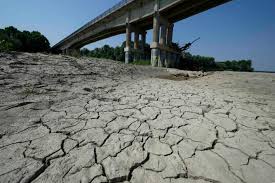Drought ravages southern Italy: a double blow to agriculture and tourism
Southern Italy is currently facing a severe drought that is causing significant damage to the region's agriculture and tourism sectors. As the scorching summer sun continues to dry up major water sources, farmers are witnessing devastating crop losses and tourism, a key driver of the economy, is suffering a significant decline.
Impact on agriculture
In regions such as Puglia and Calabria, farmers are struggling with the harsh realities of prolonged drought. Olive groves, vineyards and other staple crops are experiencing lower yields, threatening the livelihoods of thousands of families who depend on agriculture. The lack of rain has left fields parched, with some farmers reporting a 50% drop in production.
The decline of tourism
Tourism, another important component of Southern Italy's economy, is also taking a hit. Traditionally packed with visitors attracted by the picturesque landscapes, historical sites and cultural festivals, the number of tourists in the region has now declined markedly. The intense heat and water restrictions deter many from visiting, resulting in significant revenue losses for local businesses.
Economic and environmental consequences
The twin crisis of the loss of agriculture and the decline of tourism is creating a ripple effect for the economy of Southern Italy. Local markets that depend on fresh produce are experiencing shortages, driving up prices. Meanwhile, the hospitality industry, including hotels, restaurants and tour operators, is struggling to cope with the decline in tourist arrivals.
The ecological consequences are no less alarming. Persistent drought is depleting water supplies, affecting not only agriculture and tourism, but also the region's overall biodiversity. Rivers and lakes are drying up and the risk of wildfires is increasing, further threatening the environment and public safety.
Looking ahead
Overcoming this crisis requires immediate and coordinated efforts. The Italian government, together with regional authorities, is taking mitigation measures, such as water conservation initiatives and financial support for affected farmers. Additionally, there is a push for sustainable tourism practices to attract visitors while minimizing environmental impact.
In the long term, adaptation to climate change will be crucial for Southern Italy. Investments in sustainable agricultural practices and sustainable tourism infrastructure can help protect against future climate extremes, ensuring that the region remains vibrant and economically stable.
The drought in southern Italy is a stark reminder of the interconnectedness of ecological and economic systems. As the region grapples with these twin challenges, the need for comprehensive, sustainable solutions has never been more critical. By maintaining resilience and sustainability, Southern Italy can look forward to recovery and prosperity despite the challenges caused by climate change.
Additional source of information english.news




Comments
Post a Comment